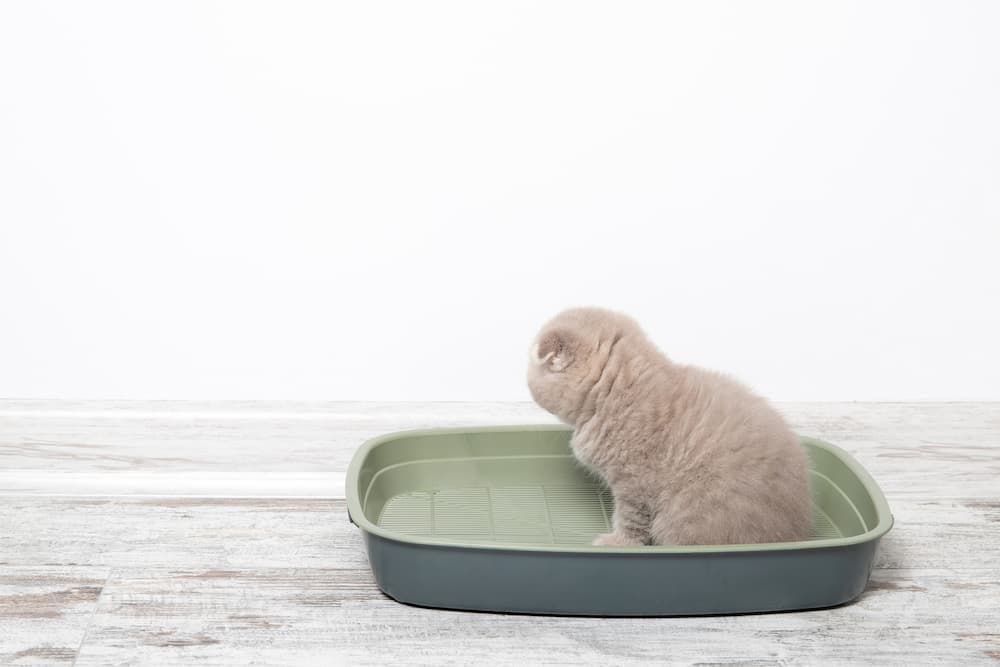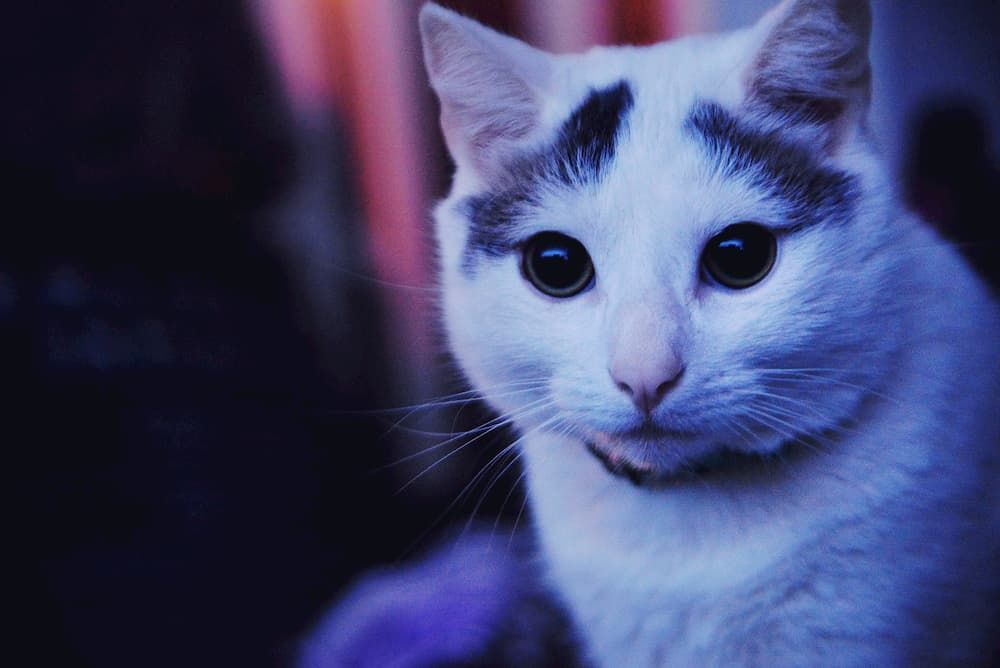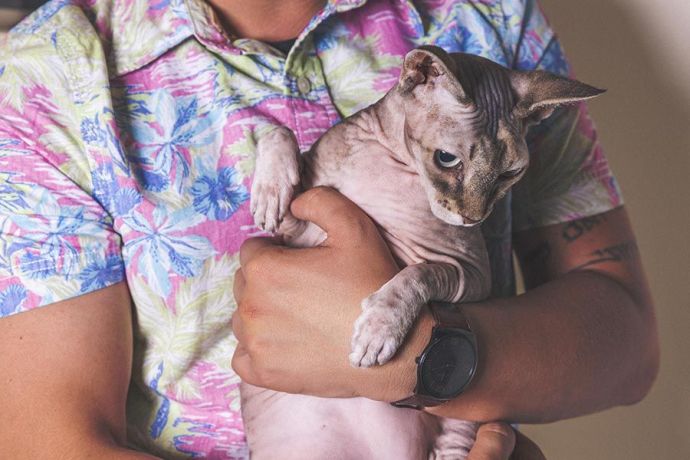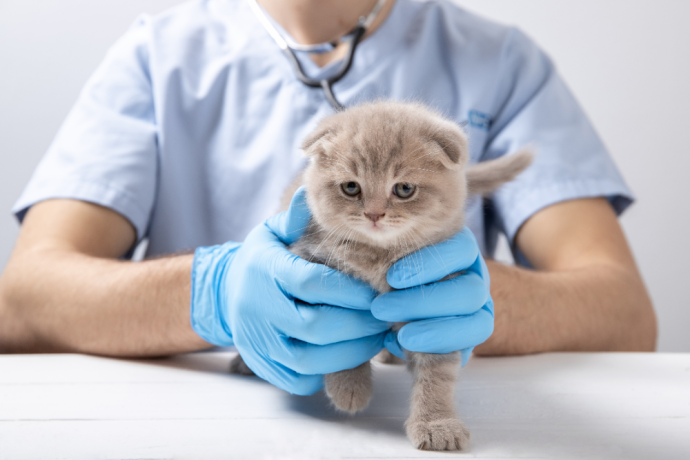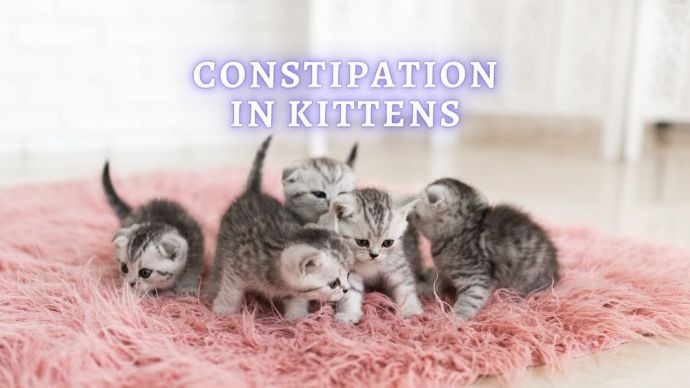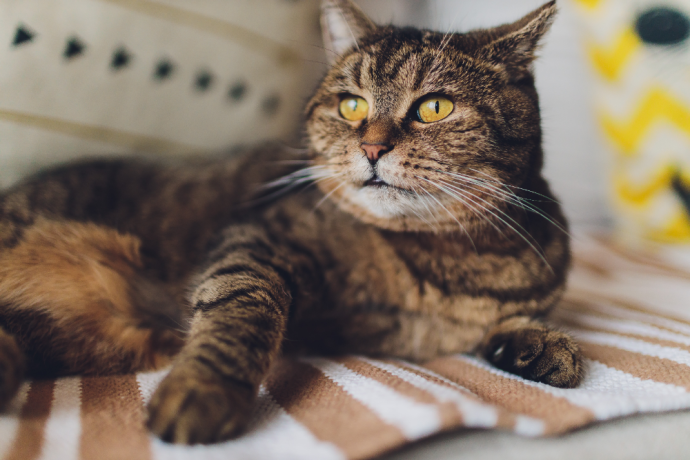How to Get Rid of Cat Urine Smell in Your House? (Vet Advice)
Written by:
Author: Dr. Amanda Jondle
Dr. Amanda Jondle is an experienced veterinary who helping pets and educating clients through writing and editing articles to inform pet owners on how to best care for their pets. Amanda graduated from Iowa State University College of Veterinary Medicine. She and her husband currently have 4 rescue dogs and 3 cats of their own and are often fostering pets with health issues until they find their forever homes.
View all 7 articlesLearn about our editorial process and veterinary review board.
Viewed: 325
Updated on: 09/28/2022
Why does Cat Urine Smell?
- Cat urine has a powerful and distinct ammonia smell. This is because pets have much more concentrated urine than dogs and other pets. Biologically, cats’ kidneys absorb every last bit of water, which allows them to drink less but still maintain their hydration.
- Intact (unneutered) male cats have an even stronger smelling urine than other cats. This is because they have more testosterone, which adds a more pungent odor. Intact male cats are also more likely to spray or mark their territory by urinating in their habitat.
How many Litter Boxes do I need?
Most veterinarians recommend that a cat owner have one more litter box than the number of pets. So, if you have two cats, you should have three litter boxes. The litter boxes should be located on each level of the house if there are multiple levels. Also, the litter boxes should be in different areas of the house in quiet, low traffic locations.
READ MORE: Where to put Cat Litter Box
What kind of litter should I used to help with the urine smell?
- There are many litters on the market for cat litter boxes. Choose one that is low dust or dust-free to help keep your pet’s respiratory tract healthy. In addition, using a clumping cat litter helps make the messes easier to scoop and keep the litter box clean.
- It is best to avoid scented litter. While a scented litter might be more appealing to our noses, cats will typically avoid a scented litter and may choose to urinate outside the litter box because they don’t like it.
RAED MORE: Dust Free Cat litter Reviews
How do you clean a Cat Urine accident?
If your pet urinates outside the litter box on the carpet or a rug, start by soaking up as much of the urine as possible with paper towels or an old rag. Once you have absorbed as much of the urine as possible, it is best to use an enzymatic cleaner. The enzymes will neutralize the strong urine smell and break down the acid in the cat urine. Saturate the area with the enzyme cleaner, let it sit for ten to fifteen minutes, and then soak it up. It is a good idea to use the paper towels or old rag on top of the mess with a heavy object on top overnight to soak up as much as possible.
If your cat urinates outside the litter box on a hard surface, wipes up the mess with paper towels or an old rag. It is still helpful to use an enzyme cleaner in this situation to get rid of as much of the urine smell as possible.
By cleaning up urine messes right away and using the enzymatic cleaner, you will be able to get rid of the bad urine smell. This will also help keep your pet from coming back to urinate in the same spot. If a cat smells the urine, they are more likely to pee again and again in the spot, either to mark their territory from another pet urinating there or because it smells like urine, and they want to keep going in that spot.
If you have a carpet cleaner, it can be helpful to clean up the mess initially. Once the carpet is clean, then use the enzyme cleaner to neutralize the smell.
Sometimes you have to call in professionals to help clean with heavy-duty equipment and cleaners. It is still recommended using a cleanser with the enzymes.
In some cases where there is a lot of urine messes or areas of repeated soiling, the best thing to do is to remove the carpet or flooring. This is especially needed if the urine has soaked through to the carpet bad or subflooring. In these cases, the floors will need to be replaced.
Avoid using only deodorizers and carpet cleaners. These may clean up the urine stain and temporarily get rid of the odor, but most of the time, the odor will return, especially on hot or damp days.
Avoid using heat or steam cleaners as the heat will set the stain and make it more difficult to get rid of the odor.
READ MORE: How to Keep Litter Box Clean
How do you neutralize the smell of Cat urine?
1. Enzymatic Cleaner
The best type of cleaner to use that will neutralize the cat urine odor is an enzymatic cleaner. The natural enzymes found in these cleaners break down the acid in the cat urine. They also contain good bacteria to help get rid of the foul odor and neutralize the bad bacteria. Douse the area with the enzyme cleaner and let it sit for ten to fifteen minutes. Then dab and soak up the moisture until it is dry. You may have to repeat this several times for the best effect. Some people have tried using baking soda, hydrogen peroxide, or a vinegar-water mixture to do the same thing. In most cases, the enzymatic cleaners work better to keep the odor at bay and last longer. Other products can get rid of the urine stain but tend to only neutralize the smell temporarily. It is never a bad thing to try both.
2. Baking soda
After you clean up as much urine as possible, and the area is dry sprinkle baking soda on the area and let it sit for at least half an hour. Then vacuum up the powder.
3. Vinegar and water mixture
Vinegar can be helpful to neutralize the bad odors from cat urine. Start with a diluted mixture of a half-cup white vinegar to one and one-half cups of water. Spray the area with the mixture and let it sit for five to ten minutes. Then soak it up with paper towels or an old rag.
4. Hydrogen peroxide
This is best used after using the vinegar and water mixture. Spray the mess area with the hydrogen peroxide and using the vinegar and water mixture. Let it sit for about five minutes. Then soak it up until dry.
Why do Cats urinate outside the litter box?
There are many reasons why your cat might be urinating outside the litter box.
- Changes in the environment can cause your cat to become stressed or anxious and show their displeasure by urinating outside the litter box. Whether it is a change in your schedule, moving to a new place, more or less people in the house, new pets added to the family, old pets dying, or changing the furniture around. Cats can be quite finicky creatures and can become stressed or anxious about nearly anything. When they are upset or stressed, they try to let you know by urinating outside the litter box.
- Medical issues are a common reason your pet is not using their litter box. Urinary tract diseases such as urinary tract infections, cystitis (bladder inflammation), urinary obstructions causing the cat to be unable to urinate, urinary bladder stones, and urinary crystals can all cause your pet to show you they are having a problem by going outside the litter box, often in small frequent amounts. Cats with diseases such as chronic or acute kidney disease or diabetes will drink more water and urinate larger amounts or more frequently, and often outside the litter box.
- Behavioral issues such as marking their territory or not getting along with other cats is another common reason a pet might urinate outside the litter box.
- If you suspect your cat has a medical or behavioral reason for urinating outside the litter box, or if you notice them urinating more or less frequently than usual, it is best to take your pet to see your veterinarian for some simple urine and/or blood tests to see if there is a medical cause.
Why is my Cat urinating more than normal?
Cats will urinate more frequently for similar reasons as above. Typically, if your pet is drinking more water, they will have to urinate larger amounts or more often. Signs of endocrine diseases such as diabetes and kidney disease can cause your cat to drink more water and in turn, have to urinate more. If your pet has a urinary tract disorder or stress-related cystitis (bladder inflammation), they can be found urinating more frequently, often in smaller amounts, as opposed to a higher volume.
Will Cat urine smell ever go away?
Sometimes, no matter what you do or used to clean cat urine messes, the smell just won’t go away. This especially happens in situations where the pet has been urinating in hidden areas that aren’t noticed right away. In these cases, it has time to sit and absorb into whatever was urinated on. Sometimes the cat comes back to the area where they urinated previously and sometimes, they go in different spots around the house.
How do I keep my Cat from urinating outside the litter box?
- Increase the number of litter boxes. Remember, always have one more litter box than the number of cats in the household.
- Change the type of pet litter. Some cats prefer a clay type litter while others prefer a pelleted or wheat substrate.
- Change the type of litter box. Most cats prefer a large, open, deep litter box, while others prefer the covered box for more privacy. Automatic litter boxes are convenient for cleaning, but some skittish or nervous cats get scared of the automatic litter boxes and avoid them.
- Make sure there are litter boxes on each level of the house and spread out in different areas. While this is often inconvenient, it is especially helpful if there are multiple pets in the house. Some cats are bullies and keep another cat from going into the litter box. Other cats prefer to defecate in one litter box and urinate in another litter box. Multiple boxes provide more options.
- Make sure to scoop out messes from the litter box frequently — at least once daily. Completely change out the litter and clean and sanitize the box every two to four weeks.
- Block off areas that the pet is inappropriately urinating.
- Avoidance methods such as covering areas where a cat frequently urinates inappropriately with tin foil or an upside-down office mat (with the pokey side up) can help keep a pet away from a particular area.
How do I keep my house from smelling like a Cat?
- The most important thing to do is make sure to clean the cat litter box frequently. Cats are clean creatures. This is why they spend so much time grooming themselves. You should clean the litter box at least once a day or invest in a self-cleaning litter box, which will clean it for you.
- Make sure you have plenty of litter boxes for the number of cats you have, as mentioned above.
- Use a good quality, odor-absorbing, dust-free litter.
- Use natural pet-safe deodorizers and air fresheners such as essential oils or homemade room sprays. Avoid using commercial room sprays as cats can be sensitive to these sprays. Also, be careful about what type of candles you burn as many have added harmful chemicals.
 Cat Veterinary Tips Cat Fleas and Ticks: How to get rid of Fleas on Cats? (Vet Advice)
Cat Veterinary Tips Cat Fleas and Ticks: How to get rid of Fleas on Cats? (Vet Advice) - 185
- 0
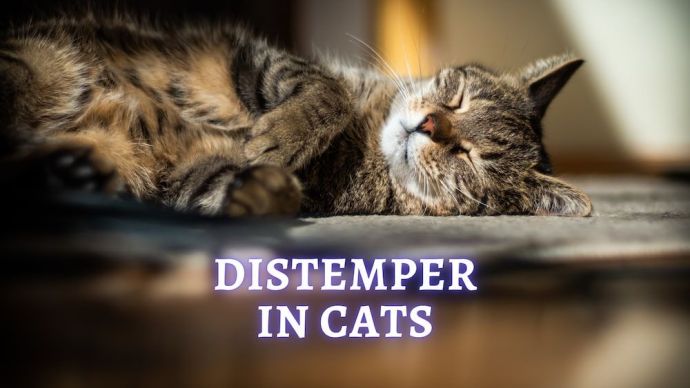 Cat Veterinary Tips Distemper in Cats: What is Feline Panleukopenia? Causes, Signs, Diagnosis and Treatment
Cat Veterinary Tips Distemper in Cats: What is Feline Panleukopenia? Causes, Signs, Diagnosis and Treatment - 299
- 0
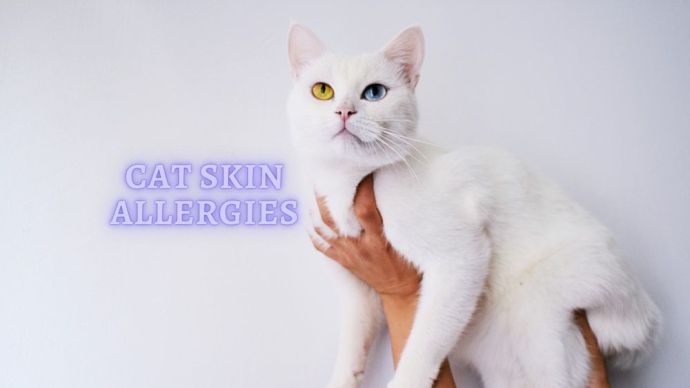 Cat Veterinary Tips Skin Allergies in Cats: Causes, Symptoms, and Treatment (Vet Advice)
Cat Veterinary Tips Skin Allergies in Cats: Causes, Symptoms, and Treatment (Vet Advice) - 542
- 0
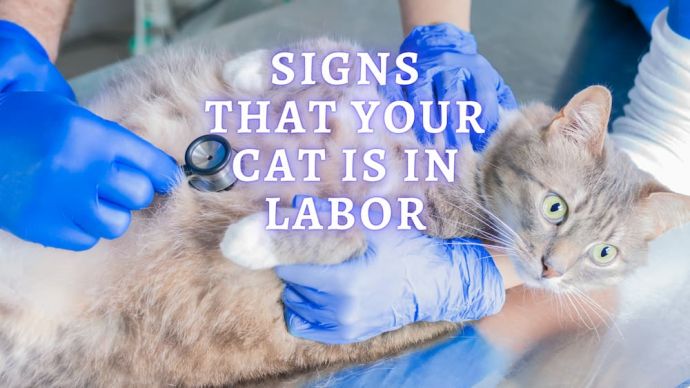 Cat Veterinary Tips Signs That Your Cat is in Labor: How to tell if a Cat is Pregnant?
Cat Veterinary Tips Signs That Your Cat is in Labor: How to tell if a Cat is Pregnant? - 15122
- 1
 Cat Care Why Does My Cat Attack My Legs? 10 Reasons Why and What To Do About It (Vet-Approved Advice)
Cat Care Why Does My Cat Attack My Legs? 10 Reasons Why and What To Do About It (Vet-Approved Advice) - 46013
- 21
 Cat Veterinary Tips Cat Stomach Gurgling: Vet Advice on Why is Your Cat Stomach Gurgling?
Cat Veterinary Tips Cat Stomach Gurgling: Vet Advice on Why is Your Cat Stomach Gurgling? - 36469
- 4
 Cat Veterinary Tips My Cat Lost its Voice: Can Cats get Laryngitis? (Vet Advice)
Cat Veterinary Tips My Cat Lost its Voice: Can Cats get Laryngitis? (Vet Advice) - 23554
- 13









